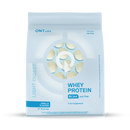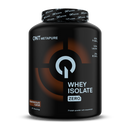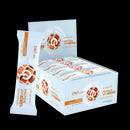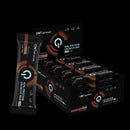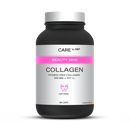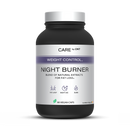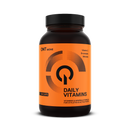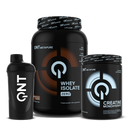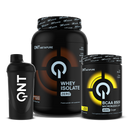Table of Contents
GLYCINE: AN ESSENTIAL AMINO ACID FOR HEALTH
Glycine is a non-essential amino acid but crucial for various biological processes in the body. Here is a detailed explanation of its key roles:
1. Inhibitory neurotransmitter
Glycine functions as an inhibitory neurotransmitter in the central nervous system, especially in the spinal cord. It exerts an inhibitory effect by binding to specific receptors, such as the NMDA glutamate receptors. This role is essential to regulate neuronal excitability, as it helps modulate nerve signals and prevent excessive activity, which could lead to disorders like seizures. Thus, glycine plays a key role in regulating nerve signal transmission, helping maintain the balance between excitation and inhibition in the central nervous system.
2. Collagen synthesis
Glycine is a major component of collagen, the most abundant protein in the human body. Collagen is crucial for maintaining the health and integrity of the skin, tendons, ligaments, and joints. In fact, about one-third of the amino acids in collagen’s structure are glycine. This role is vital for repairing and regenerating body tissues, especially in cases of injury or wear. Glycine contributes to forming this fibrous protein, which strengthens tissue integrity and elasticity.
3. Precursor of important molecules
Glycine is involved in the synthesis of several essential molecules for the body:
- Creatine: A key compound for energy production in muscles and the brain. Creatine plays a crucial role in physical performance, especially during intense efforts.
- Glutathione: A powerful antioxidant that protects cells from oxidative damage and promotes detoxification in the body.
- Acetylcholine: An important neurotransmitter for communication between nerve cells and muscle contraction.
- Porphyrins: Molecules essential for hemoglobin production, which is necessary to transport oxygen in the blood.
These functions demonstrate that glycine plays a key role in many vital biological processes, including energy production, cell protection, and nerve transmission.
4. Bile acid metabolism
Glycine also plays a role in bile acid metabolism, which is essential for fat digestion. It conjugates with bile acids to form bile salts, which improve the solubilization and efficient transport of fats in the digestive system. By facilitating fat digestion, glycine indirectly but importantly contributes to the regulation of lipid metabolism and the overall proper functioning of the digestive system.
Glycine is a key amino acid in several important biological processes. It not only supports the health of the nervous system and body tissues but is also involved in crucial metabolic processes such as energy production, defense against oxidative stress, and digestion. Its key role in the formation of collagen and other important molecules, as well as in regulating nerve and digestive functions, demonstrates how vital this amino acid is for the proper functioning of the body.
GLYCINE BENEFITS AS A DIETARY SUPPLEMENT
Glycine, although a non-essential amino acid, can be beneficial as a dietary supplement, especially in situations where its natural production is insufficient. Here are the main benefits observed when consumed as a supplement:
1. Tissue regeneration
One of the primary benefits of glycine as a supplement is its role in the repair and regeneration of body tissues. It is particularly beneficial for the repair of bones, tendons, cartilage, and skin. This is due to its key role in the formation of collagen, an essential protein for the structure and health of connective tissues. Consuming glycine can promote healing after injuries or chronic trauma by helping to repair damaged body tissues.
2. Improved sleep
Glycine also has positive effects on sleep quality. It acts as a natural relaxant, promoting relaxation and helping to reduce anxiety, which facilitates falling asleep. Some studies have shown that glycine, when taken before bedtime, can improve sleep duration as well as the feeling of well-being upon waking. It may help better regulate sleep cycles by lowering body temperature, which is conducive to deeper, more restorative sleep.
3. Metabolic support
Glycine also plays a role in energy metabolism. It is involved in the synthesis of essential molecules, such as creatine and glutathione, which are involved in energy production and antioxidant protection. By improving these metabolic processes, glycine can support the overall energy of the body and help better combat oxidative stress, thus promoting better overall health.
Although glycine is not an essential amino acid in the strict sense, it plays a key role in several important biological processes. When taken as a dietary supplement, it can have significant effects on tissue regeneration, sleep improvement, and metabolic support. These benefits make glycine a useful supplement, especially in situations where its natural production is insufficient, such as in certain pathologies or aging.
WHAT ARE THE FOOD SOURCES OF GLYCINE?
Glycine, although a non-essential amino acid, is found in a variety of foods from both animal and plant sources. However, dietary intake of glycine can sometimes be insufficient, especially for those following vegetarian or vegan diets, making supplements particularly useful in some cases. Here is a detailed overview of the main dietary sources of glycine:
1. Animal sources
Animal sources are richest in glycine because they contain a large amount of collagen, a protein high in glycine. Examples include:
- Meats: especially pork, beef, and chicken, are excellent sources of glycine, particularly cuts rich in connective tissue such as cartilage, bones, and skin. Pork or beef ribs and cheeks are particularly rich in glycine.
- Fish: also a good source of glycine, especially fatty fish like salmon and trout, which, in addition to glycine, are rich in omega-3 fatty acids beneficial for heart and joint health.
- Dairy products: such as milk, cheese, and yogurt, also contain small amounts of glycine. Although the content is lower, they remain a source of amino acids for those consuming animal-derived products.
2. Plant sources
Plant sources of glycine are less abundant than animal ones, but several interesting options exist, such as:
- Spirulina: this blue-green algae is a plant source of glycine. It is also rich in proteins and essential micronutrients like vitamins and minerals.
- Soy: and its derivatives (tofu, tempeh, soy milk) contain glycine. Although the amount is lower than in animal products, soy remains a complete plant protein ideal for vegetarian or vegan diets.
- Pineapple: a fruit rich in bromelain, a digestive enzyme, it also contains small amounts of glycine and can contribute to overall intake as part of a varied diet.
3. The importance of supplements
Although glycine is present in many foods, it can sometimes be difficult to obtain enough from diet alone, especially for vegans or those who consume little animal products. Additionally, certain health conditions or aging can reduce the body's natural production of glycine.
Glycine supplements can then be a useful solution to support tissue regeneration, improve sleep, or strengthen joint health. They can be integrated into an overall wellness strategy, particularly for active individuals or during recovery periods.
Glycine is found in a wide range of foods from both animal and plant sources. Animal sources, including meat, fish, and dairy products, are the richest in glycine. However, for vegetarians or individuals with increased needs, plant sources like spirulina, soy, and pineapple can offer an alternative. In cases of specific need or dietary insufficiency, dietary supplements can be an effective solution to ensure adequate glycine intake.
ARE THERE ANY SIDE EFFECTS OR CONTRAINDICATIONS?
Glycine is generally considered safe and well tolerated when consumed in recommended amounts, whether through diet or supplements. However, as with any supplement, there are some possible side effects and contraindications to consider, especially in cases of excessive intake or special conditions.
1. Possible side effects
Glycine is a natural amino acid used by the body for various essential functions, but excessive consumption can cause side effects, although these are rare. The most frequently reported side effects include:
- Gastrointestinal issues: Excessive glycine intake may lead to bloating, nausea, abdominal cramps, and diarrhea. These symptoms are usually mild and disappear once intake returns to normal levels.
- Excessive sedation: Although glycine promotes relaxation, too much can cause drowsiness or excessive fatigue during the day. It is important not to exceed the recommended doses, especially if you need to stay alert.
2. Contraindications and precautions
While glycine is generally safe, some individuals may have contraindications or should take precautions before starting supplementation:
- Drug interactions: Glycine may interact with certain medications, particularly those affecting the central nervous system or blood pressure. Consult a healthcare professional if you take antidepressants, antipsychotics, or antihypertensive drugs.
- Pregnant and breastfeeding women: As a precaution, it is advised to seek medical advice before taking glycine during pregnancy or breastfeeding.
- Kidney problems: In cases of kidney failure, amino acid accumulation may worsen the condition. Medical supervision is recommended before supplementation.
3. General recommendations
- Respect recommended doses: Glycine is generally safe at doses of 1 to 3 g per day, depending on individual needs and health goals.
- Consult a professional: Before starting supplementation, talk to a doctor or nutritionist, especially if you have medical conditions or take medications.
These precautions help maximize the benefits of glycine while minimizing the risk of adverse effects.
In general, glycine is well tolerated by the body and poses few risks when consumed appropriately. However, excessive intake can lead to gastrointestinal issues and drowsiness. It is always advisable to consult a healthcare professional before starting supplementation, especially if you are taking medications or have underlying health conditions.
GLYCINE CAN IMPROVE SLEEP?
Yes, scientific studies have shown that taking glycine before bedtime can have a beneficial effect on sleep quality. This amino acid acts as a neuromodulator in the central nervous system, promoting relaxation and reducing stress.
1. Reduced time to fall asleep
Glycine can help reduce the time needed to fall asleep. It promotes a lowering of body temperature, which sends a natural signal to the brain to initiate sleep. This property is particularly useful for occasional insomnia or difficulty falling asleep.
2. Improved sleep quality
In addition to facilitating falling asleep, glycine helps reach deeper and more restorative sleep phases. By acting on inhibitory receptors of the central nervous system, such as NMDA receptors, it calms excessive brain activity and supports better mental and physical recovery.
3. Reduced stress and anxiety
Glycine is also known for its natural anti-stress and anxiolytic effects. By modulating brain areas involved in anxiety, it facilitates mental disengagement at the end of the day and creates a favorable environment for falling asleep, without causing dependence.
4. Promising research
Recent studies suggest that glycine may also improve memory and concentration the next day, in addition to its beneficial effects on sleep. This dual impact on nighttime rest and cognitive performance makes it a preferred supplement for those seeking a natural solution to poor sleep quality.
Glycine can be an effective supplement to improve sleep by reducing the time it takes to fall asleep, promoting deeper sleep, and decreasing stress. These effects make it an attractive choice for those seeking a natural solution to enhance sleep quality. However, it is always recommended to consult a healthcare professional before incorporating glycine into a supplementation routine, especially if you have specific concerns about your sleep or health.
GLYCINE BENEFICIAL FOR ATHLETES?
Yes, glycine can be beneficial for athletes, particularly regarding muscle recovery and improvement of physical performance. This amino acid plays a key role in several biological processes directly related to athletes' needs.
1. Role in creatine synthesis
Glycine is involved in the natural synthesis of creatine, a molecule essential for providing rapid energy to muscles during intense and short-duration efforts. By promoting creatine production, it supports explosive sports such as weightlifting, sprinting, or interval training.
2. Improvement of muscle recovery
Essential for collagen formation, glycine helps repair muscle, tendon, and joint tissues stressed during training. It thus contributes to accelerating recovery after effort, strengthening connective structures, and preventing injuries related to overload or repetitive sports movements.
3. Reduction of inflammation and oxidative stress
As a precursor to glutathione, one of the body's most powerful antioxidants, glycine helps combat oxidative stress generated by intense training. It also promotes reduction of inflammation, which can limit post-exercise muscle soreness and support better cellular regeneration.
4. Optimization of cognitive abilities and concentration
Glycine not only supports muscles: as a neuromodulator, it also promotes a mental state of calm and focus. This can be a real asset for athletes practicing disciplines requiring vigilance, coordination, and responsiveness, helping better manage pressure and stress during effort.
Glycine can play an essential role for athletes by improving performance, accelerating muscle recovery, and supporting the health of joints and connective tissues. Its involvement in creatine synthesis and the reduction of oxidative stress makes it a useful supplement to optimize training and competition. If you are an athlete looking to enhance your performance and recover faster, glycine can be a valuable addition to your routine. However, as with any supplement, it is always advisable to consult a healthcare professional before starting supplementation.
COACH'S TIPS
Amino acids are very important for all athletes, and glycine is no exception. Taking an amino acid supplement always helps an athlete to progress.
Read more
 Training
TrainingGroup classes more effective than classroom work?
We often ask this question: which one is the most effective? Group training or individual workout programs in the gym? Let's first consider the two...
Summer body edition for men: How to prepare your body?
Gentlemen ? The return of the sun and its warm rays are almost here! The degrees are slowly but surely rising, but what about your muscles? Ouch! I...
 Training
TrainingSHOULD YOU USE A WEIGHT BELT FOR LIFTING?
The next person you see in the squat cage with 20 kg on the bar and a big belt, maybe you can make a comment after reading these few lines.
 Our Tips
Our TipsHow to train flexibility?
The way to train flexibility is often highly controversial. Depending on the sports you practice, you work differently. A dancer and an athlete tra...
 Dietary Supplements
Dietary SupplementsWhy take turmeric?
There are hundreds and hundreds of spices with different properties and turmeric is obviously one of them! It is a spice that is generally quite we...
Which fat burner to choose?
To lose weight and burn fat, there is no secret: you have to do sport and take care of your diet. However, it is possible to speed up the process t...
 Our Tips
Our TipsFasting and sport: 9 tips for training during Ramadan.
Working out during Ramadan is not easy. Not eating from sunrise to sunset is a major challenge for athletes wishing to continue their activities. T...
 Our Tips
Our TipsSummer holidays: How to limit the damage?
On holiday, we often tend to let ourselves go. Unless you're a hardcore sportsman, you tend to abandon your trainers and indulge in a lot of dietar...
 Health
HealthHow to preserve your joints?
We have a total of about 400 joints located throughout the body. We therefore quickly understand why joint problems are quite common. You don't hav...
 Our Tips
Our Tips9 good reasons to do sport.
Sometimes the urge to exercise is not always there. And although we always tell ourselves that this year will finally be the right one to get back ...

